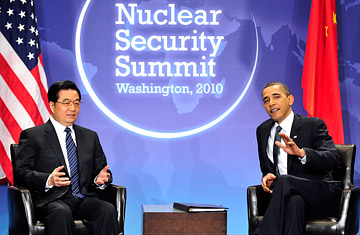
Barack Obama and Chinese President Hu Jintao meet during the Nuclear Security Summit in Washington.
Nearly a decade ago, a President of the United States used the specter of a nuclear blast to argue his case for invading a foreign country. "We don't want the smoking gun to be a mushroom cloud," President Bush's then National Security Adviser Condoleezza Rice told CNN in 2002, a sound bite that came to define the rationale for a pre-emptive war in Iraq despite the lack of proof that it presented a WMD threat.
This week, another U.S. President, Barack Obama, invoked mushroom-cloud imagery to argue for a major diplomatic initiative. "If there was ever a detonation in New York City, or London, or Johannesburg, the ramifications economically, politically and from a security perspective would be devastating," Obama said Sunday. He was speaking just hours before the start of the Nuclear Security Summit, arguably the largest diplomatic gathering on U.S. soil since the U.N.'s founding conference in San Francisco in 1945.
The summit, which opened Monday, convenes 47 nations — 38 of which sent their heads of state — and symbolizes President Obama's goal, announced in April 2009, to restart the world on the slow journey toward eliminating nuclear weapons. And it comes during a season of heightened diplomatic focus on nuclear matters.
Last week, Obama and Russian President Dimitri Medvedev signed a new strategic arms treaty, which focuses on reducing the enormous stockpiles of warheads that each side retains from the Cold War nuclear arms race. Next month, diplomats from around the world will convene in New York City for the five-yearly review conference on the Nuclear Nonproliferation Treaty, which is focused on preventing non-nuclear states from joining the club while those with nuclear weapons move toward disarmament. The Washington summit is focused on a different challenge: the need to secure existing stocks of weapons-grade nuclear materials to keep them out of the hands of terrorists or criminals.
"You never really get this kind of concentration from heads of state on something that is this technical," says Kenneth Luongo, a former nonproliferation expert at the U.S. Department of Energy who now runs the Partnership for Global Security. "Not every state agrees that this is a major problem. One real benefit is to get all these people in the room to talk about why this matters."
Already, the White House has announced a number of incremental steps toward securing the thousands of tons of nuclear material that could be used to make a bomb. On Monday, Canada announced plans to ship spent nuclear fuel to the U.S. for safe keeping, following the lead of Chile, which recently shipped about 40 pounds of enriched uranium to the U.S. Ukraine, a former Soviet-bloc country, also announced its intention Monday to ship out its entire stockpile of highly enriched uranium by 2012. All of the participating countries are expected to sign a nonbinding communiqué Tuesday, expressing their shared commitment to continue working on these issues.
White House Spokesman Robert Gibbs, in a Monday briefing, said the Obama Administration welcomed the opportunity to house more of the world's loose nuclear material, saying he believes the American people support such transfers. "I think they'd feel far more secure knowing that that material is under safe lock and key and guarded in this country, rather than potentially floating around somewhere else," he said.
To underscore the importance of the summit, several Obama aides talked up the threat posed by loose nuclear materials. "Al-Qaeda and other terrorist groups know that if they are able to acquire highly enriched uranium or separated plutonium and turn it into a weapon, they would have the ability not only to threaten our security and world order in an unprecedented manner, but also to kill and injure many thousands of innocent men, women and children," said White House counterterrorism adviser John Brennan on Monday. "Disturbingly, international organized criminal syndicates and criminal gangs are keenly aware of the strong interest of terrorist groups to acquire fissile material."
Concerns over nuclear security have always played a central role in Obama's approach to foreign policy. As a young man, he wrote a college thesis on U.S. and Russian arms reductions, and one of his first initiatives in the U.S. Senate was to work with Indiana Senator Richard Lugar, a Republican, on securing loose nuclear materials in the former Soviet Union. Obama's first major world address took place in Prague on the issue of nuclear security.
The summit itself also highlights a core feature of Obama's approach to the world stage, markedly different from his predecessor's wariness of prolonged diplomatic engagements without clear deliverables. The Obama White House sees the very process of diplomatic discussion, in many ways, as its own reward, a small but necessary step toward future results.
Even before the summit officially began, and despite its modest final goals that involved no binding commitments, Obama aides were hailing its significance. "What we're trying to do is to raise the level of awareness and attention and participation in those legal structures as key elements of our toolkit," explained Laura Holgate, the senior director for WMD terrorism and threat reduction at the National Security Council. "The communiqué is not legally binding. It is a political document." But the Administration will claim success from simply having pushed the issue of nuclear security a little further up the agenda of countries with a role to play in keeping nuclear materials out of terrorist hands.
